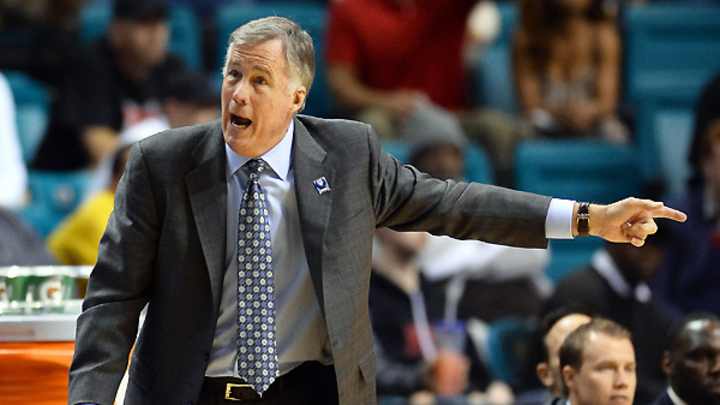Mike Montgomery provided many great West Coast basketball moments before retiring

Mike Montgomery finished his college coaching career 676-318 with stops at Montana, Stanford and Cal. (Ethan Miller/Getty)

Eight years old and pacing in front of the family television, I’d lost hope. With the clock dwindling under a minute, Stanford trailed Rhode Island by six in the 1998 Elite Eight. I was an avid Cardinal fan, and they were my bracket champion in Dad’s office pool. Tears welled as a win appeared impossible. Stanford’s comeback (highlighted by Mark Madsen’s and-one and hip shimmy) remains an indelible childhood memory. Two years later I was parading around that same living room when Stanford stunned Duke. The elation I experienced prompted a lifelong lesson: Miracles can happen so long as the clock doesn’t expire.
I loved watching Mike Montgomery coach, so I felt a tinge of sadness when he announced his retirement on Monday. A stern man with oversized bifocals, tousled salt-and-pepper hairdo and so many ill-fitting suits, Montgomery looked more scholar than athlete (good thing I didn’t say this to his face -- I’d later learn he’s a black-belt martial artist). He didn’t have Lute Olson’s knack for recruiting nor John Calipari’s hair gel. Yet, after a successful stretch at Montana, he spent 18 years at Stanford, establishing it as one of the West Coast’s top programs. His predecessor, Tom Davis, had left the school after four years citing the obstinance of the Admissions Office. Impossible to win there, not in that conference with those academic standards. But when Montgomery’s tenure at The Farm ended, the school had made its first Final Four and won at least one NCAA tournament game in 10 consecutive seasons.
GALLERY: Biggest retirements in sports in 2014
My heart sank when the ESPN2 ticker noted that he’d left Stanford to coach the Golden State Warriors in 2004. With little more than a passing thought, I figured it was the last time that Mike Montgomery would coach one of my teams. By the time I headed off to attend Berkeley in 2007, any Cardinal red and Stanford fanhood had been left at home.
I wasn’t exactly reunited with Montgomery, but his surprise hire at Cal in 2008 was pure serendipity. He wasn’t quite ready for a life of TV color commentary, though he had scrapped the glasses for some contacts and even found himself some classy dress shirts. As an aspiring sportswriter, I covered the Cal basketball team during Montgomery’s first three seasons in Berkeley, sitting quietly in the corner during press conferences to listen to his assessment of practices and games.
Standoffish to some, snarky to others, Montgomery never was too approachable or patient with the press; he always maintained a guarded stance behind the mic. His disdain for trite probing was obvious, but more often than not he’d tailor lucid answers to intelligent questions. Any query about a player’s performance or a critical stretch in the game received thoughtful assessment; questions about “gauging of the feeling of your team” were answered with a single, terse sentence. He did tear into me after Kawhi Leonard and San Diego State torched his squad, though. Don’t ask about how well the defense played when the other guys scored 49 points in the second half.
But Montgomery could coach. He had an uncanny knack for developing big men and running a fluid offense. He groomed obscure recruits and clumsy walk-ons into polished role players, breeding a tenacity and fierceness within his teams without conceding grace. I imagine playing for Montgomery was frustrating. Frequent compliments were not part of his playbook. But on the best nights, the byproduct was seamless, beautiful basketball with plenty of open shots and intuitive second-half adjustments.
Montgomery’s legacy at Cal will never trump his accomplishments at Stanford, but he still compiled the school’s best stretch since the legendary Pete Newell retired in 1960. His coaching mastery shined in Cal’s two tournament wins against Louisville in 2010 and UNLV in 2012. When the school won its first Pac-10 conference title, I experienced some of the same childhood ebullience that I had felt 12 years prior. Go ahead and ridicule me for my low standards, but my fellow Cal fans know the grind.
Montgomery, of course, wasn’t without flaws. Until last season, his recruiting classes at Cal were unimpressive and his disdain for the current system was transparent. In George Dohrmann’s book “Play Their Hearts Out,” Montgomery laments the fate of Demetrius Walker, unfairly treated and emblematic of “everything that’s wrong with the system today.” Watch any of his interviews and it’s evident that there are better coaches in a recruit’s living room. The prevailing criticism was that despite a distinguished career, his best teams often fizzled in March.
Montgomery’s legacy exists because he was a consummate coach. With his mastery of the game’s nuances, his refusal to compromise principles and his consistent demand for excellence in his players, Mike Montgomery established himself as a pillar of West Coast college basketball. He won 676 games at the collegiate level and he did it without equivocating or catering to his players.
